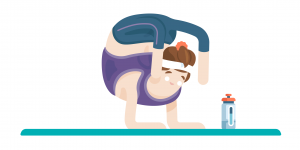Believe it or not, our diet can put us in a good mood (or a bad one!)

Ever heard of the ‘food mood’ connection? There’s growing evidence to show that how and what we eat affects how we feel. And how we feel affects what we choose to eat or drink.
Not surprisingly, a diet that boosts our physical health also benefits our mental health: good eating habits and the right food choices can actually make us feel happier, more energised and help us to think more clearly. Follow our tips to manage your mood with food…
In this article:
Keep Blood Sugar Steady
Familiar with that afternoon slump where you’re struggling to stay focussed and could just curl up and go to sleep? One of the key factors in sustaining energy levels is keeping blood sugar levels stable. Your brain needs blood sugar (glucose) to function well, and if it’s not getting the right amount, your whole body will be affected, making you tired, irritable, and unable to think straight.
Eating patterns and certain food types impact our sugar levels; we can help keep it steady by eating regularly, staying hydrated, and incorporating foods that release energy slowly into the bloodstream (e.g. protein and complex carbs), whilst limiting those that cause blood sugar to rise and fall rapidly (e.g. caffeine or simple carbs like sugary foods and drinks).
Maintaining normal blood sugar can have numerous benefits, helping us to stay alert and full of energy, avoiding mood swings and food cravings, improving our memory, controlling our weight and just making us feel good!

Stop the Slump
For many of us, a blood sugar spike and crash typically occurs around lunch time, leaving us lethargic and fatigued (known as the ‘lunchtime-lull’). The best way to combat this is to avoid a heavily carbohydrate-based meal around the middle of the day; focus instead on incorporating a balance of carbohydrates, fats and protein sources into your meal, which will leave you feeling satisfied and energised. However, it’s very important not to cut out carbohydrates completely, they are a major energy source in our diets – just understand the different types and how to make good choices.
Carbs, Blood Sugar & the Glycaemic Index (GI)
The Glycaemic Index (GI) is a rating system for foods containing carbohydrates, showing how quickly they affect blood sugar levels.
High GI foods include simple carbs, which are quickly converted into glucose and cause a fast blood sugar spike with a rush of energy, followed by a crash – which leaves you feeling lethargic and fatigued.
Low GI foods including complex carbohydrates, are digested more slowly, releasing energy gradually, with less effect on blood sugar.
Note that the GI rating cannot be used as a definitive guide to whether a food is healthy or unhealthy (e.g. watermelon has a higher GI value than chocolate cake!) and cooking methods or combinations of foods can affect the absorption of carbohydrates. However, we should incorporate some low GI foods as part of a healthy, balanced diet.What is the Glycaemic Index? – NHS
Don’t Skip Meals
Missing even one meal causes your blood sugar levels to drop and saps your energy.
Skipping meals can also slow down your metabolism (the process that converts food into energy). If you leave too long without eating, your body goes into survival mode, in a bid to conserve energy until the next supply of food arrives; so instead of burning calories, you store them.
Also, if you’re low on energy, your body craves high calorie food (fatty sugary things that you might otherwise avoid) and causes you to overeat when you eventually get your next meal, taking in more calories than you really need. So ironically, a pattern of skipping meals can actually result in weight gain or make it harder for people to lose weight.
Breakfast Boost
Don’t miss breakfast (even if you’re in a rush, or not very hungry!) When you first wake up, you probably won’t have eaten for at least 10 hours, so your blood sugar levels will be very low. Get the day off to a good start with a protein-rich breakfast (e.g. eggs or plain yoghurt, fresh fruit and nuts) to boost your mood, energy and cognitive performance early on.
Try our nice (but not naughty) recipe for Banana pancakes with Warm Blueberry Drizzle.
Eat Regularly
Rather than skipping meals or scoffing a large lunch/dinner (which can leave you full and sluggish), try to eat smaller amounts spread out regularly through the day. That means your body receives a continuous source of fuel, which will help keep your blood sugar levels stable.
Aim to get the nutrients you need in as natural a form as you can, from whole foods rather than ready meals or fast-foods e.g. choose porridge oats over sweetened breakfast cereals, enjoy a piece of fruit instead of a dessert.

Wholesome Whole Foods
Whole foods are as close to their natural state as possible i.e. with no or minimal processing or refining and free from additives. This means they will be full of nutrients – high in vitamins, minerals, antioxidants and fibre – which are often lost during processing.
Examples:
- Fruit and veg
- Beans and legumes e.g. kidney beans, chickpeas, lentils
- Whole grains e.g. oats, brown rice, quinoa, whole wheat
- Seeds and nuts (not salted)
Power up with Protein
Protein, fat and carbohydrates are macronutrients, which means our bodies require large amounts in order to function optimally and maintain long-term good health. (Vitamins and minerals, which are needed in only small amounts, are micronutrients).
Protein is made up of amino acids, often called ‘the building blocks of life.’ All our cells and tissues contain protein, and every part of our body needs a constant supply to function properly; it is essential for growth, repair and general health. Protein also helps to stimulate the brain, keeping us alert and energised.
The complex structure of proteins means they take longer to digest and will release energy slowly, helping to keep blood sugar levels steady. Protein also helps to slow the absorption of any carbohydrates eaten with it.
Packed with Protein
Protein-rich foods will keep you feeling fuller for longer. Try to include some at every meal (and for snacks):
- Lean meat and poultry
- Fish and seafood
- Eggs
- Low-fat dairy: Greek yoghurt, milk, cheese (particularly cottage cheese, cheddar, mozzarella, parmesan, Swiss cheese)
- Nuts (especially almonds, cashews, pistachios, walnuts) and nut butters
- Seeds: chia seeds, flaxseeds, pumpkin seeds, sunflower seeds
- Avocado
- Vegetables: asparagus and leafy greens (broccoli, spinach, kale)
- Beans (kidney beans, black beans) and legumes (chickpeas, split peas, lentils)
- Whole grains: oats, quinoa, brown rice, wild rice, buckwheat
- Soy products: edamame beans, tofu
For a protein-rich breakfast or anytime snack, try our simple smoked salmon, feta & dill muffins.
Cook a batch, then enjoy hot or cold over the next few days.
Be Careful with High-Protein Low-Carb Diets
A very high protein diet combined with very low carbohydrate intakes is not recommended; despite weight loss being one of the benefits, this type of diet will send the body into ketosis – shutting off the major energy supply in the body and leaving you feeling fatigued, irritable and hungry. Often advertised through FAD diets, it is very hard to maintain and is not sustainable for long periods of time.
Low-Carb, High-Protein Diets – Harvard Health
Eat Good Fats
Don’t avoid fats, just eat the right ones. Fatty acids (especially Omega-3) are essential to keep the brain functioning well, promote heart health and they also have mood-enhancing benefits.
Fat Facts
Good fats called monounsaturated and polyunsaturated fats are found in oily fish (salmon, tuna, mackerel, sardines) and seafood, avocados, nuts (particularly almonds and walnuts), seeds (especially flaxseeds), olives and olive oil, eggs, dairy (yoghurt, milk, cheese) and dark chocolate.
Avoid trans fats – manufacturers often use these fats in frying and baking, or to prolong shelf-life e.g. pies, cakes, biscuits and fast-foods. On lists of ingredients they are usually called ‘hydrogenated or ‘partially hydrogenated’ oils/fats or ‘shortening’. Trans fats have been associated with high cholesterol, obesity and various diseases, as well as poor mental health.
Limit saturated fats – found in butter, cheese and red meat. Simple ways to reduce your intake include swapping to reduced-fat dairy and trimming fat off meat before cooking.

Have Your 5 A Day
Fruit and vegetables provide plenty of vitamins, minerals and fibre that we need to stay physically and mentally healthy.
Fruit & Veg Tips
One portion = a handful, small bowl or glass.
Eat a rainbow of colours, to ensure you get a good range of nutrients.
Fresh, frozen, canned, dried and juiced all count towards your recommended daily amount.
Eat Well – 5 a day: what counts? – NHS
Try Watermelon Fruit Salad as a refreshing dessert, or add feta for a BBQ side.
For colder months, make our Winter Warmer Ribolitta Soup recipe – it’s a great way to use up any leftover veg!
Confused about Carbs?
Carbohydrates may have got a bad name in recent years, but it is very important not to eliminate them completely from your diet – they are an important nutrient and a major fuel source for the body and especially for the brain. During digestion, carbohydrates in food are broken down into blood sugar (glucose), which is then absorbed into the bloodstream and transported to our cells to provide energy.
However, not all carbs are the same – some are better for our blood sugar levels and offer greater nutritional value than others. It’s important to understand the different types so you can make good choices.
There are 2 kinds of carbohydrates:
- Simple carbohydrates (or simple sugars)
- Complex carbohydrates (starch and fibre).
These 2 types are categorised by their chemical structure and how quickly the sugar is digested and absorbed into the bloodstream.
Simple Carbohydrates
These simple sugars are broken down and absorbed quickly, raising blood sugar levels faster and often higher than complex carbs. The resulting energy rush usually swiftly subsides, causing a slump within a few hours. Because the process is quick, you are more likely to feel hungry again soon afterwards.
Small Doses…
Simple carbs in processed, refined and sweetened foods should be enjoyed only in small quantities and not too frequently (e.g. sweets, sugary foods, fizzy drinks, white bread and junk food). They provide calories but little nutritional value and will cause your blood sugar to spike and crash, making you tired and cranky. These foods might tickle your taste buds but they won’t help your mood!
Note there are also natural sources of simple carbs in far more nutritious foods like fruit and milk, which can be included within a balanced diet.
…But Don’t Ban Treats
Whilst you need to ensure your diet is nourishing to your overall health, it is also important to enjoy indulgences in moderation, without guilt; that is good for the soul and depriving yourself is unhealthy – it can be very damaging to adopt this kind of really strict mindset! Treating yourself occasionally is absolutely OK and will help you to maintain a balanced diet and a healthy, positive relationship with food.
This Is Why Treating Yourself To ‘Bad’ Foods Is Totally Okay – Huffington Post
Complex Carbohydrates
While most of us should limit our consumption of refined simple carbs, we do need plenty of complex carbs, particularly fibre. These carbohydrates have a more complex structure and take longer to digest; so they release glucose into the blood stream more slowly, resulting in a smaller change in the blood sugar level and a steadier, much longer-lasting supply of energy, for hours after you have eaten. The fibre content gives bulk, so you stay fuller for longer. These foods also provide a wider range of nutrients (such as vitamins, minerals and antioxidants), which benefit general health.
Good Carbs
The healthiest sources of complex carbs are the least processed or refined:
- Fibre-rich fruit: apples, cherries, grapefruit, oranges, pears, plums, bananas
- Starchy vegetables: sweet potatoes, squash, potatoes, peas
- Non-starchy vegetables: asparagus, leafy greens, broccoli, carrots, cauliflower, celery, cucumber, green beans, mushrooms, onions, peppers, tomatoes
- Beans and legumes: baked beans, black beans, kidney beans, chickpeas, lentils
- Whole grains: oats, brown rice, quinoa, wholegrain bread & cereals
- Nuts & seeds: walnuts, almonds, pistachios, pine nuts, hazelnuts, cashews, chia, sesame & sunflower seeds
Snack Sensibly
Eating between meals can keep your metabolism rolling, but just be careful what you pick when you’re feeling peckish. Avoid the snack attack, by making healthy choices that keep blood sugar stable and maintain energy levels. Go for snacks packed with protein and fibre to keep you fuller longer, or food full of essential vitamins and minerals.

Simple Snacks
6 healthy snacks that are both appetising and satisfying:
- Fruit on the go: apple, banana, orange quarters, or bowl of blueberries
- Hummus or cottage cheese with veggie sticks: carrot, red pepper, cucumber, celery
- Smashed avocado on wholemeal toast
- Savoury popcorn – DIY with salt, pepper and chopped fresh herbs (rosemary or thyme)
- Salted edamame beans
- Handful of mixed nuts and seeds
Stay Hydrated

We all know that hydration is essential to health, but research shows it is also critical to brain function. Even mild dehydration can slow down body functions, leaving you feeling sluggish, moody and unable to think clearly; it can cause poor concentration, short-term memory problems and even anxiety.
Watch out for possible signs of dehydration: headache, dizziness, cramps, constipation, fatigue, irritability, feeling cold, dry skin, bad breath, a craving for sweet things. These symptoms will usually subside once you are sufficiently rehydrated. So drink plenty of fluids, to prevent your condition becoming more serious.
Drinks Tips
By the time you feel thirsty, you’re already dehydrated – keep that water bottle handy!
Drink plenty of water, 6-8 glasses a day.
Herbal and green teas, or diluted fruit juice can help top up your fluids.
Caffeine control: Caffeine is a well-known stimulant, which can give you a quick burst of energy and help keep you alert. But don’t overdo it, or you could get the jitters, a racing heart and heightened anxiety. Avoid drinking caffeine too late in the day, or it may stop you getting a good night’s sleep.
Caffeine is in coffee, tea, chocolate, cola and lots of energy drinks. You might feel better if you cut down or avoid it altogether – try decaff versions. The general recommendation is no more than 400mg of caffeine per day (4-5 cups of coffee).
Alcohol in moderation: be aware that alcohol is a depressant and can disturb your sleep. A recent study in Spain showed that drinking 2 – 7 glasses of wine per week led to less depression. But higher weekly consumption actually contributed to depression. Moderation is key!
Be Good to your Gut
The gut is our digestive system, but it plays a huge role in the health of our entire body and mind – contributing to our immune system, heart and brain health, and affecting our moods and sleep.
The Gut-Brain Connection
Have you ever wondered why you get ‘butterflies’ in your stomach when you’re nervous, you can feel worried sick, or you just have a ‘gut-feeling’ about something? These sensations occur because the gut and brain are strongly connected, and what goes on in one, impacts the function of the other.
The gut is sometimes referred to as our ‘second brain’. The two organs are connected physically via millions of nerves that send signals in both directions, and also biochemically through neurotransmitters (chemical messengers) produced in both the brain and the gut, which control our emotions and moods. (You may be surprised to know that your gut produces most of the ‘feel-good’ chemicals in your body e.g. serotonin).
This communication network between the gut and brain is known as the gut-brain axis; an anxious mind sends signals to the gut, just as a troubled gut sends signals to the brain. This explains why your emotional state may trigger symptoms in your stomach e.g. stress can make the gut speed up or slow down, which can cause digestive problems. Likewise, the state of your gut affects your mood and brain function; in fact, poor gut health (including low serotonin levels) has been linked to anxiety and depression.
So we need to look after our gut, for the sake of our overall health and mental wellbeing -and nutrition plays an important part.
Gut Health & the Role of Nutrition
We have trillions of microbes in our gut, which are broadly categorised by good bacteria (that aid digestion and metabolism, produce vitamins and strengthen the immune system) and bad bacteria (which are a common source of infection).
These microbes also produce the neurotransmitters that influence our brain function and moods.
Our gut health and brain chemistry are directly related to the balance of good and bad bacteria in the gut, so if it’s off-kilter, it can impact our physical and mental wellbeing. We can take simple steps to maintain a healthy gut environment through diet – by including foods that promote beneficial bacteria, whilst limiting those that cause harmful bacteria to flourish.
Good for your Gut
Promote good bacteria with prebiotics
Prebiotics are food compounds that feed our friendly bacteria, so they thrive, multiply and outnumber the bad bacteria; the main prebiotic nutrient is fibre.
High fibre foods: whole grains, vegetables and legumes, fruit, nuts and seeds; some of the most effective are asparagus, artichokes, garlic, onions, leafy greens, leeks and bananas.
Add more good bacteria with probiotics
Probiotics are live good bacteria, found naturally in fermented foods like live yoghurts, miso, kimchi, sauerkraut and pickles.
Try our simple recipe for Kale and Tahini Noodle Superfood Bowl.
Omega-3 fats found in oily fish, can increase beneficial bacteria in the gut.
Limit foods that suppress beneficial bacteria or promote growth of damaging bacteria e.g. processed, sugary and fatty foods.
Besides a healthy balanced diet, other tips to boost gut health include: reduce stress levels, exercise regularly, stay hydrated, get enough sleep (7-8 hours), and eat slowly.
Bacterial balance in the gut may be disrupted for various reasons, including poor nutrition, aging, taking antibiotics, or illnesses such as IBS or food poisoning. In some cases, probiotic supplements can help restore the balance, but always check with a medical professional.
In a Nutshell…
Good nutrition is essential for a healthy body and mind.
As we have seen, there is a strong connection between our eating habits and our state of mind. How and what we eat can cause blood sugar fluctuations, alter the bacterial balance in our gut and affect the production of brain chemicals (neurotransmitters) that regulate our moods, emotional resilience and energy levels.
Not surprisingly, there is growing evidence to suggest that a diet that optimises physical health also boosts mental wellbeing – by providing the essential ingredients for producing neurotransmitters, a healthy gut environment and stable blood sugar.
- Stay hydrated
- Eat regular meals
- Opt for a balanced diet, with an emphasis on whole foods that are high in protein, complex carbohydrates, good fats, vitamins and minerals.
- Go easy on caffeine and alcohol, and try to limit your intake of sugary, fatty and processed foods (that tend to be high in sugars, simple carbs and trans-fats, and have little nutritional value).
When we hear so much about how bad habits can negatively impact our lives, these are simple, positive steps that can hugely improve our health and happiness.
Eat well, feel good!
Bear in mind it can take time for your body to adjust to new eating habits or diet, so it’s best to introduce any changes slowly, and understand that it might be a while before you feel the benefits.
Note: This is for general guidance only. If you have any concerns about food intolerances or allergies, consult your doctor or a professional nutritionist or dietician. If you have a medical condition or are taking medication, you may need to avoid certain foods or drinks, so check with your doctor or pharmacy.
With thanks to Jess Simpson, graduate in Nutrition BSc(Hons), for all her help with this article and her delicious recipes!
Find out more:
Champion snooker player Ronnie O’Sullivan has swapped his cue for the chopping board, to collaborate with top nutritionist Rhiannon Lambert on a new book ‘Top of Your Game: Eating for Mind and Body’, showing how to eat, think, and work your way to being your very best. It’s full of recipes and helpful tips for maintaining a healthy body and mind.
Sources:
Food Moods
The Food-Mood Connection – Des Moines University
What Foods are Good for Energy? – Wh Foods
21 Reasons to Eat Real Food – Healthline
Blood Sugar
Sleepy After Lunch? We Found Out Exactly Why It Happens – Huffington Post
Protein
Brain Power: Why Proteins Are Smart – Psychology Today
Eating Protein Instead Of Sugar Helps Keep Us Awake And Alert, Say Experts – Huffington Post
Fats
Omega-3s For Boosting Mood – Psychology Today
Choosing Healthy Fats – Help Guide
5 a Day
Eat Well – 5 a day: what counts? – NHS
Carbohydrates
Simple Carbohydrates vs. Complex Carbohydrates – Healthline
Stay Hydrated
10 Signs You’re Dehydrated — And How To Hydrate Fast – The Daily Meal
How much coffee is safe? – BBC News
Gut
What’s an Unhealthy Gut? How Gut Health Affects You – Healthline
Why it’s crucial to look after your gut health – 9Coach
The Gut-Brain Connection: How it Works and The Role of Nutrition – Healthline





